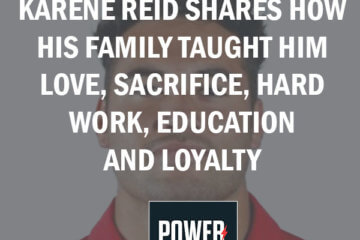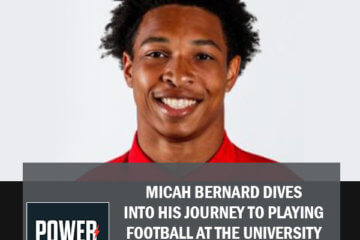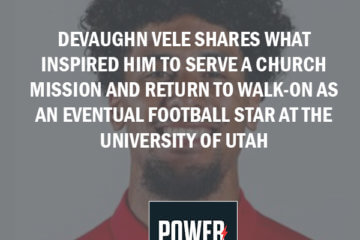Listen to the podcast here
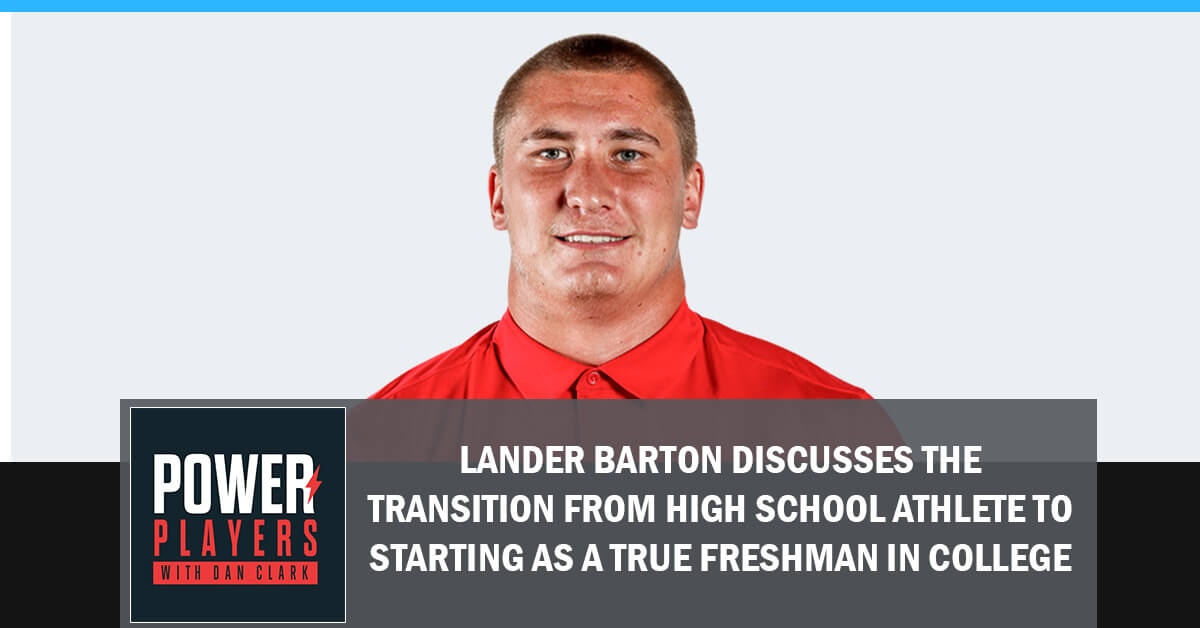
Dan Clark continues his special podcast interviews with the extraordinary football players of the University of Utah Utes. In this episode, Lander Barton discusses his transition from being a high school athlete to starting as a true freshman in college. He also dives into how his parents, who are both basketball players, instilled into him the idea of perseverance and appreciating the good lessons that come from losing. Lander also talks about why he considers himself a cowboy off and on the field, and looks back on the time he fractured bones in his spine.
—
Lander Barton Discusses The Transition From High School Athlete To Starting As A True Freshman In College
I’ve had the opportunity to interview so many of our elite superstars. As a reminder, my friends, when you’re a fan in the stands, it’s amazing how we have to educate one another because so many people don’t realize the fundamentals of football. Not every player is designed to score a touchdown. There’s nothing more insignificant than the halftime score. If you want to know if you’re a champion, losing hurts worse than winning feels good. Are you with me?
Every single interview has allowed me to ask questions from everyone in our section, 50-yard line, fourth row, crazy fans. We’re not up in the luxury suites. We want to smell the game. We want to hear the game. We want to feel the impact. We want to hear the conversations where every linebacker shows up at the line of scrimmage in a bad mood.
From my vantage point, especially with the opportunity to interview our superstars, this interview is going to be one of the most inspirational because of the questions I’m going to ask Lander Barton. He’s a true freshman. He barely came out of high school. He’s an All-American at Brighton High School here in Salt Lake City, Utah. He was invited to play in the All-American game, and with so many accolades as a superstar high school player. When I played football and baseball at the U, so many athletes who were superstars in high school did not make that transition to the college level because they lack speed. They were extraordinarily strong or whatever as a high school player, but somehow that didn’t translate into becoming a superstar at a D1 school.
It’s very rare when we have an opportunity to see a true freshman, not just step up and fill in for a starter who might go down or step up and have an opportunity to get some action here or there, but to see somebody who has a quality of play, the quality of character, the quality of resilience that Lander Barton brings to the table. Hang onto your seats, my friends.
You should even pull out a yellow pad and a pen because I’m going to ask him some questions that will help you as high school athletes prepare yourself for scholarships to make that transition into the D1, D2, or JUCO world. I also want to talk about his family influence and how important it is for you to put family first, football second, and take care of your teammates and friends probably in that order, all under the understanding of family, faith, country, and all those wonderful things that make this Utah culture so extraordinary.
—
Lander, it is such an honor to have you here. How old are you?
I’m 18 years old.
I could not believe it when I read that. You play like a seasoned senior. How did you grow up? In the formal introduction, we know about the royal blood flowing through your family’s veins and it begins with your mom, Mikki, not your dad, Paul. Let’s not throw him under the bus, but come on.
It’s true.
She’s an all-American. She’s in the Crimson Club Hall of Fame at the University of Utah. Your amazing sister is an amazing athlete. We watched your two brothers, Cody and Jackson. They’re playing in the NFL, but then all of a sudden you come sliding into the family and in the sibling mix. You were under the radar. I didn’t know they had this superstar younger brother coming through the ranks. All of a sudden you show up at the U and you didn’t miss a step. Talk to us about growing up in a family of superstar athletes. Did competition come out at the dinner table? Did you wake up earlier than your brother because you needed to beat him to the bathroom? Talk to us about growing up in the Barton household.
It was not all sunshine and rainbows growing up, I’m going to be honest, for me, I missed a lot of the real competition between my older siblings because I’m 5 and 6 years younger. I was a little kid when they were in high school and getting older. I was able to watch everything they did. I just watched and listened. I feel like my biggest growth came because of that.
I was able to watch all their games and practices. Go to volleyball tournaments and watch twenty games a day. Being there and seeing it all gave me a picture of what I needed to do to be good. Seeing all these good athletes that they play against or themselves, there’s great information to take in at a young age, and then try to work myself into the picture that I saw when I was young if that makes sense.
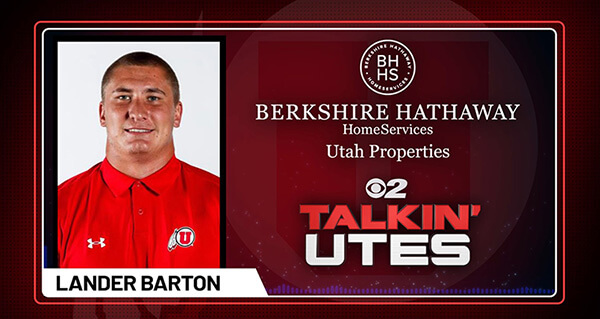
High School Athlete: Improve your athletic performance by watching other athletes play.
Think back on some specific conversations where your sister perhaps had a lousy game. What was the advice that your mom gave her? When your brothers blew it, gave up a touchdown, or screwed up a block on the offensive line, what were those conversations from your parents like to give them that confidence to get back up and go again?
Failure was not acceptable when we were growing up. We had to be the best. We had to win. In basketball, we had to score twenty points a game or it wasn’t good enough.
Incidentally, your average is nineteen points a game as a junior at Brighton High School.
Unfortunately, I did.
If winning is not everything, winning is the only thing according to Coach Vince Lombardi. Talk to us about what happened when you failed. What was the conversation? Was it like, “I’m not going to talk to you for three months?” What was it like?
We never got the silent treatment. It’d be more like we’d be in a car driving back from the game and getting chewed out and yelled at and saying, “Yes, sir. Yes, ma’am.” Sometimes you take some stuff in. Sometimes it’s through one ear and out the other. They would tell us good things. My dad and mom were both basketball players. In basketball, I feel like they had the best ability to give us advice on what to do specifically.
Especially in basketball, because you don’t count the shots you miss. You only count the shots that go in. To run that mindset alone, maybe that counsel came from a more positive perspective than a negative one.
It’s true, but also if we didn’t take enough shots in a game, you’d be getting yelled at a little bit.
I love it. As the famous Wayne Gretzky said, “You miss every shot you don’t take.”
You can’t score 20 points shooting 10 shots, but you can make every shot, so you got to shoot at least 20 shots.
What emphasis did your parents put on practice versus the games? What was the understanding in your home about the significance of working hard?
Hard work was everything. Starting from our dad to Jackson to Cody to Dani to me. He passed it down as we grew up. He taught us at a very young age what it was like to work hard. As a player and as a person, I work hard, but there’s a huge emphasis on being a hard worker, accountable, and getting things done. They were pretty hard on us. We could not be lazy in the house. Growing up, we didn’t take naps. I don’t think I’ve ever been a nap person because if we were seen taking a nap, we’d get woken up and told to do something right away.
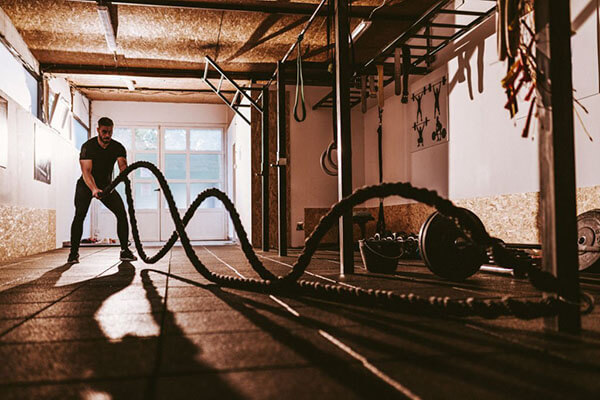
High School Athlete: Start working hard at a very young age. Be accountable for getting things done.
What do your parents do?
My dad helps run his family’s business, which is a packaging company, cardboard corrugated boxes with him and his brother that their dad started. My mom is a world traveler now. She’s going to all my brother’s games and my games. She’s going to see my sister. She’s all over. She’s active and always working out like hiking. She doesn’t sit down in one place.
Your aura is a cowboy. In the Air Force, we have call signs. My call sign is Hot Lips, no questions. We’ve all seen the movie Top Gun Maverick. We know Maverick, Goose, Iceman, and Rooster. If there was one word that describes you, what would it be?
I’d want it to be a cowboy but I’m from the city so I can’t call myself a cowboy.
You got your boots going on and your jeans. You show up with your ball cap on. You’re a cowboy. When the word cowboy comes out, what do you think about it? Do you think about hard work? The cows need to be milked at 4:00 AM regardless of what the weather or if you have a cold or are sick, you got to get up and do your chores. We didn’t talk about this before the interview, but you shredded your stuff in like, “I’m a cowboy,” and I tapped into that. Talk to me about why cowboy represents you off the field and on the field.
For starters, I love horses. I love the cowboy lifestyle in the country, riding a horse every day, working cows, and doing something like that. Coach Whit preaches it all the time. He said, “The hay is never in the barn,” so the work is never finished. You always got to keep going. There’s no time to stop and rest. I truly believe that the hay is never in the barn. I like to say you can rest when you’re dead.
That’s a Mamba Mindset. It’s like Kobe Bryant, “Rest when the game’s over, not during the game.” A cowboy is tough. I was a Golden Gloves boxer. I’d fight anybody except a cowboy because you’d hit them with everything you have and they’d look at you like, “That’s all you got, buddy?” The Washington State Cowboy mentality from Pullman brings a little bit more grit to the competition than their record.
They were a good team. They fought hard. They had good players out there. They were making plays and were disciplined. We didn’t take that game for granted. We knew what we were getting into.
As a defensive player and an offensive player, you scored sixteen touchdowns as a receiver in high school. You had quite an illustrious high school career. I compliment you on that, but then when you come to U and they make you a defensive linebacker, I noticed that they move you around. Sometimes you’re blitzing in the A gap. Sometimes you’re out on the slot with the agility with your size, 6’4 and about 230.
For all the ladies, I was in the training room when he was getting some extra work done on his knee. You’re a specimen. You’ve taken good care of yourself. You’re pushing so hard as a true freshman. You blow my mind. As a versatile linebacker going inside, going outside, taking people, and unmanned coverage, what’s your favorite part of the game? Is it the run defense? Do you like standing there and showing up in a bad mood? Do you like open wild freeness of dropping into pass coverage? What’s your favorite part of the game?
I had this question. They asked me if I liked the pass game or the run game. I honestly like both. The run game is the physical aspect of football. You’re coming downhill and smacking people in the mouth, but the pass game shows intelligence, knowing route concepts, where to drop, and where the quarterbacks wanted to put the ball if he recognizes your coverage. I don’t like run or pass, but I like the aspect of playing linebacker. You got to be smart. You got to be intelligent. You got to know what’s going on everywhere on the field. offensively and defensively.
Pass game shows intelligent-knowing route concepts: where to drop and where quarterbacks wanted to put the ball if they recognize your coverage. Click To TweetHow do you gain that competitive advantage? Is it only through film study or do you prepare and push yourself competing against yourself in the locker room, in the weight room, and the nutrition? Talk to us about your regimen. How do you prepare and keep yourself as an elite athlete?
It’s all of it. You got to be able to be in the film room every day, constantly in there watching films, studying not just your opponent but yourself and your team. For my regimen, you got to workout. It’s in season so people relax on their workouts, but you still got to push yourself. You’re lifting out 2 or 3 times a week and training your muscles. Eating is a big part of it. You got to get your calories in, and then you got to get your water intake in.
You then got to save that time taking care of your body and getting the treatment. You got to get some compression on your legs, a massage, and anything like that. Personally, I go to Pilates probably 2 to 3 times a week. I feel like that has been a big advantage to me. Keeping me flexible, keeping my core strong, my joints mobile and strong, and working on any part of my body that’s hurting or bugging me at the time. I’m working that out and getting stronger.
Have you ever sustained a serious injury in all of your years as an athlete?
Yes, I have. During my freshman year of high school during a football season, I fractured the L5 par bone in my spine.
How did you do that? In a game?
No. It was over time because growing up I’d always have back pain. It’s always been the same thing. I finally got X-rays and they showed a fracture in it. We called it spondies. Basically, your spine starts slipping out of place a little bit.
Were you always a big kid for your age then? Maybe that had something to do with your growth.
It could either be growth or genetics. Maybe a thinner par bone in the spine or it could have been growth because I’ve always been a taller kid than everyone else my age. I wouldn’t necessarily say I was heavier. I was heavier because I was taller, but not like a big kid.
How did you recover from that injury? I’m old and had my hip replacement. The kicker on that is your rehab. I chose to go to the Park City Hospital because they take care of the Olympic athletes. The mindset of pushing that athlete beyond anybody’s imagination allowed me to recover so fast. I’ve never had a bit of pain since I came back and work hard. The mindset of a usual family orthopedic, someone who says, “Look at this. What happened to your spine? You can’t ever play again. I’m so sorry.” Obviously, you didn’t take that advice. What was your rehab?
It wasn’t any typical rehab. I started at an orthopedic center in Holladay. I was probably there for maybe a week or two weeks. They did good stuff, but I went to this lady, shes’ a Pilates instructor. I’m not going to say her name. I started going to her three days a week consistently when I was fourteen years old since the time I broke my back. We would work on all sorts of things weekly. My recovery process was very fast and I was able to heal the fracture.
How many months was that, 2 or 3?
No. I want to say maybe September to February. It was a decent amount of time. I don’t get much pain in my back anymore. It’s never been a problem for me since then.
That’s very cool. How do you prepare for a game mentally? Do you listen to specific music? What’s your routine on game day? Let’s break it down. If it’s an early game, where do you start? If it’s a later game in the night, 7:00 or 8:00 PM, where do you start to get fired up? I used to run kickoffs and punts, and I used to lose 30 pounds waiting for the kicker to kick it while doing all my things.
Finally, our sports psychologist at the university said, “The analogy is a rubber band. What you do during pregame is you leave it loose, and then as the game time gets closer and closer, you start stretching that rubber band. When you get in the end zone and you’re ready to return the kickoff, it’s maximum. As soon as that kicker kicks the ball, you let go and catch the ball.” You’re a cat. I can’t let go of that analogy because I watch you, and when you take the field, you seem like you’re gearing up and getting ready to fire up, and then all of a sudden, the first play of the game, you rise to the occasion. Teach us what’s going on in your mind as we watch you from the stands.
On a typical game day, I never get crazy fired up. I don’t show a lot of energy or juice because I’ve been a calmer person my whole life. Before games, I’ll listen to calm country music or something like that.
Let’s put in a plug, like what?
Maybe some Zach Bryan and Tyler Childers. I’ll listen to calm music to let my body and mind relax.
I’ll give you one of my country hits. It’s If I Had Shot You When I First Met You, I’d Be Out of Jail by Now. That’ll fire you for third down and long.
I’ll give it a listen. As it gets close to the game, we’re about to run out there, I’ll start listening to faster pace music.
In the locker room. Do you have your headphones ready?
Yes.
When you get ready to run out of the tunnel, you just put your headphones down?
I put the headphones down. That’s when you need to lock in right there. All the energy of the crowd and around me, I try to absorb all of it. I don’t want to say be one with it, but make myself comfortable in the environment, whether it be a home environment or an away environment. I let myself be in the moment and be there, but I’m still relaxed in my mind. I’m trying to think of what I need to go over in that game, what I’m going to see or visualizing stuff. Once we’re on the field and play is about to happen, I got to clear everything out and have one focus right there.
When preparing for a football game, be in the moment and relax your mind. Visualize what you want to do in the game. Once you’re in the field, everything is already clear to you. Click To TweetWhat’s your favorite food?
I have to say my favorite meal would be a nice ribeye, medium rare with dry sweet potato salad.
We’re having all the guys over to our house for a Traeger grill night, so I’ll make sure we get a ribeye on that grill for you.
Do you make a good ribeye?
Yes. What advice would you give to a high school athlete? You’re a four-star athlete and the second-highest-rated player coming out of Utah. You have all these accolades nationwide, yet you decide to come to the University of Utah. Why did you choose the U? Don’t give it to me like, “My brothers played here. My sister, my mom, and my dad, and it’s expected of you.” You had a chance to go to multiple schools. Drop 2 or 3 names that recruited you, and then tell us why you chose the University of Utah.
I was recruited by a lot of the West Coast schools. A lot of the PAC-12 teams and some ICC and ACC, but the biggest reason for coming to Utah is it’s my home. I can see my family. I can also live away from them for twenty minutes. Also, Utah has a big program. It’s come up for the past few years. People might not view Utah on the same level as maybe Ohio State, Michigan or Alabama, but when I was looking at schools, I wasn’t choosing a school for their name.
I was picking a school because I knew how they could develop players and use players in their system and how to become a better person and a better man. If football doesn’t work out, you still got to live life. Utah’s history has always been great. Honestly, I’m not certain about this but it’s probably top in the country at developing 3-star, and 2-star athletes, and NFL products.
Yes, 4 and 5-star athletes. You came out as a four-star and clearly, as a true freshman, you become a 5-star. That’s because of the Utah influence, Whit’s, Harding’s, and Scalley’s philosophy on the offensive line, and everybody who contributes.
There are no easy days in Utah football. It’s always a grind. You’re always working hard in practice. Coach Whit preaches at me. We’re a hard-practiced team. We don’t practice soft. We go hard, run to the ball, and hit on days we’re supposed to hit. I feel like going through that every day, you’re bound to develop and become a better player quickly. Coming in for spring ball helped me with that. Learning the speed of the game, getting more physical, and being able to handle alignment, the physicality and the speed that we practice with makes a whole difference.
There are no easy days in Utah football. It’s always a grind. Click To TweetYou can tell that on the field. If you were going to make a recruiting video, what would you say to a young high school kid? Why should they come to the University of Utah instead of taking a $1 million bribe and a NIL deal to go to Alabama?
I’d ask them where they see themselves. If they’re serious about football and see themselves in the NFL or getting ready for the NFL, then Utah’s a great place because they’ll develop you and make sure you’re able to get there or at least have a shot too.
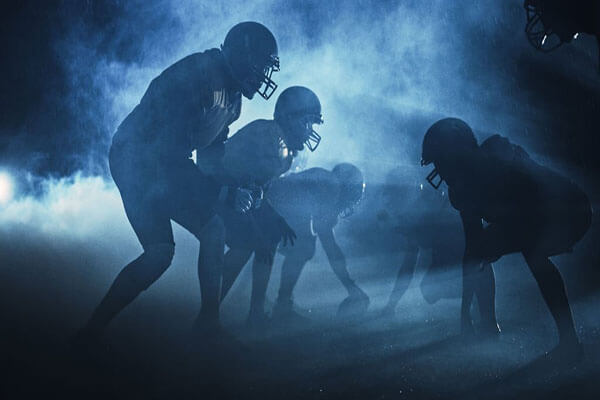
High School Athlete: If you are serious about football and want to get ready for the NFL, Utah is a great place to develop your skills and get support.
I remember Coach Mack was my coach in a program and he quoted a statistic. About 93% of D1 athletes, maybe even D2 and D3 college athletes end up living in a city where they played college ball because you get a chance to meet the movers, shakers, and influencers in our community, and create those lasting friendships and bonds. You’re doing that right now. If you had a message for the NIL community, the name, image, and likeness, how can we help Utah athletes? How can we help the current Utah athletes to stay here because they know how much we care, and sometimes we need to step up financially, not just emotionally, and with our amazing culture of family first mission always?
What advice would you give to the NIL community and business community on what we can do to help recruit 4 and 5-star athletes like you to come to the U in case money seems to be the issue? What’s the differentiating factor of why they come to Utah? You’ve already said it, but let’s tie the money in because if you come for money, you’ll leave for money. That’s no way to develop loyalty in a program. It seems like the continuity of our coaching staff has got to be a plus, where the coaches have been here forever and remain here. What advice would you give? I’ll let you talk from your heart about football, Utah, and NILs.
For me, I was not in anything for the NIL or the money. If you’re a good player, and I was thinking to myself that I’m a good player, eventually you need to showcase that and money will come to you. It won’t come to you, but opportunities will show up that you can take advantage of. I wasn’t in the recruiting process looking for who was going to pay me and pay me more. For some players, that’s what they’re looking for. Salt Lake is a close-knit community, but it’s not a small city. I feel like most people in the State of Utah are pretty close-knit because we don’t have an NFL team. We have the Jazz, so everyone’s a fan of the Jazz, so it’s either Utah or BYU.
The majority of the people here are fans. All eyes are on you. People are supporting you. We have good players, good students, and good kids up here on campus. Some are coming from far places and they’re coming to Salt Lake City, Utah. People think there are Mormons in Utah and that’s about it. There’s a lot to offer and a lot of new faces, so it’s an uncomfortable environment for some people. Companies can recognize that and see they’re a good kid, a new face in an unfamiliar city, so a little extra money wouldn’t hurt.
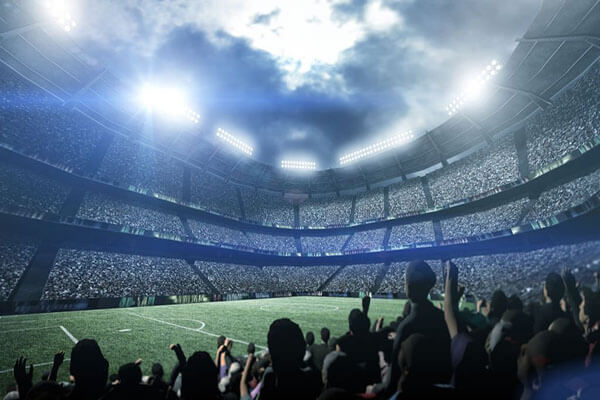
High School Athlete: Salt Lake City has a close-knit community. All eyes are on you, which can be quite uncomfortable for some people. However, this also means you will get much support in your athletic career.
Were you here when the tragedies with 22 and 22 with Jordan and Lowe happened or did you come in on the aftermath of that?
I was not on the team at the time.
How has that impacted you? I’ve mentioned this a couple of times in other interviews with some of the players, what brings tears to my eyes is when we get to the fourth quarter, they replay that video, and the opposing team acknowledges. We’re playing USC and they’re in the battle of their life, so are we, and there were about 7 or 8 of the USC players who broke away from their team huddle, and they just stood, looked and clapped.
How does that impact you as a player knowing that tradition matters, and that players are more than just muscle and bone going through motion? They’re real men that you honor and love. That’s what reminds us about us more than football when that comes out at the beginning of the fourth quarter. What does that do to you emotionally as a young man as far as the tribute that you play to those fellow players every single game?
It’s like what you said, it’s more than football. I didn’t personally know Ty or Aaron. Every time we see those videos, it reminds us that it’s something bigger than playing the game. You have a reason why you’re doing it. Each person is out there for their own reason. It’s a great reminder of that. We’re here to play a sport together, but everyone has their own things they’re going through. I could be going through something and my teammate could be going through something completely different. We both are going through it, but we’re going through it together. We have each other’s sides. It’s a great reminder that everyone’s here for each other and we’re playing a game we love. If you’re hurting, lean on your brother because he knows what you’re going through.
In conclusion, how does that translate into life? You’re going to make it in the NFL. You’ll be playing against your brother sooner than later. What have you learned from football that has turned you from a boy into a man at eighteen years old? You’re one of the more mature young men I’ve had a chance to meet. You play like a superstar senior. How does that equate to you off the field when you finally put the pads away and you just have to be a Lander?
Playing football teaches you what it’s like to work. I don’t want to say suffer, but to go through the pain and push through that pain. Playing football and getting ready to come to the U, I put myself in a hole where I stay on a strict schedule and strict diet. I hang out with friends every once in a while, but my social life is nothing crazy. It taught me to be able to grind and work. If you are able to do that, you can achieve what you want. That could come with anything like weight gain, a job outside of football, a business job, or a sales job. That’s the biggest thing I’ve learned is to work hard work and grind.
From a philosophical perspective, let me throw one favorite quote around Lander Barton’s interview here. As I’ve listened to him and tried to listen in between the lines, he epitomizes one favorite quote, if you sit around wondering whether or not your glass is half empty or half full, you’ve missed the point. It’s refillable. Thinking positively or thinking negatively doesn’t fill up the glass, the pouring does.
He’s talking about work ethic. He’s talking about Tim Grover’s book, Winning, where when someone says what is happiness? They say, “Lalaland,” and he says, “No, Michael Jordan, Kobe Bryant.” Lander Barton says, “No, happiness is pain, sacrifice, work ethic, getting back up and going again, and pushing yourself to your ultimate capacity and potential as a human being.” I appreciate the philosophies he’s taught us about what it takes to be successful in any aspect of life.
Remember, it’s easier to act your way into positive thinking than it is to think your way into positive action. You can think your way and say, “We’re going to win this game,” but unless you put in the work, you can’t expect the win. You epitomized hard work, character and class. I can’t wait to watch you play again and again. When you’re playing on Sunday, I hope you’ll remember your experience at Utah because we love and honor you. You have inspired everyone and the fans to work hard once the game is over. Thank you so much for that example as an eighteen-year-old superstar.
Thank you.
You’re awesome.
Important Links
- Lander Barton – Instagram
- Winning
About Lander Barton
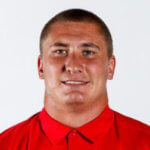
2022: Appeared in 13 games games with three starts.
- College Football News Freshman All-America Second Team.
Pac-12 Freshman Defensive Player of the Year. - Leads true freshmen on the team in tackles (42), TFL (5.0) and sacks (3.5).
- Seven games with four or more tackles.
- Coming off a career-high six tackle effort (0.5 TFL) in the Pac-12 Championship vs. USC, with a fumble recovery, one breakup and a QB hurry.
- Had five tackles (0.5 sack) in the win over Stanford.
- Made a 10-yard sack during the regular season finale at Colorado.
- Forced his first career fumble vs. Arizona.
- Had a seven-yard sack in the conference opener at Arizona State.
- High School: Four-star recruit out of Brighton HS, rated the No. 2 recruit in the state of Utah on 247Sports and the No. 17 linebacker nationally on Rivals.
- Named a High School All-American, invited to the All-American Bowl.
- Two-time all-state first team selection.
- Two-time all-region first-team, also earning Region 6 MVP in 2020.
- Named MaxPreps Player of the Game 13 times at Brighton.
- Recorded 122 total tackles (8.0 sacks) with two interceptions his senior year.
- Had 139 tackles (12.5 TFL, 4.5 sacks) as a junior.
- Racked up 104 total tackles as a sophomore (11.0 TFL, 1.5 sacks).
- Recorded six interceptions at Brighton, three returned for touchdowns.
- Played wide receiver as well, recording 909 yards on 81 catches, scoring 16 receiving touchdowns in high school.
- Also played basketball, averaging 19.0 points, 7.2 rebounds, 1.5 assists and 1.3 steals per game as a junior to earn second-team all-state.
Personal: Son of Mikki and Paul Barton, who were both two-sport athletes at Utah … father played football and baseball at Utah … mother is a member of the Utah Crimson Club Hall of Fame and was a two-time All-American in basketball … has two brothers and a sister … brother, Cody, was an all-Pac-12 linebacker at Utah from 2015-19 and is currently playing for the Seattle Seahawks after being drafted in 2019 … brother, Jackson, earned all-Pac-12 as an offensive lineman at Utah from 2014-18 and is playing for the Las Vegas Raiders … sister, Dani, is the all-time leader in career kills, sets played, matches played and attempts for Utah Volleyball as a four-time All-American from 2017-21.
